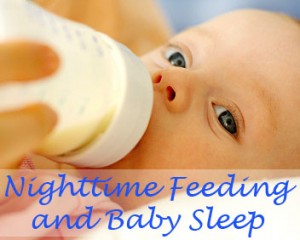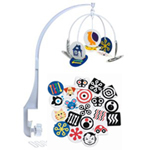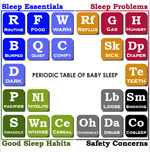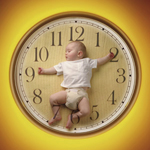 One of the most important things to get right to help your baby to sleep through the night is the nighttime feeding. In most cases, this is the last time you feed the baby before you go to bed, and how you do it will affect how much sleep you’ll get. For newborns this doesn’t really apply; they eat every two to four hours, so you’re going to be up in the middle of the night regardless.
One of the most important things to get right to help your baby to sleep through the night is the nighttime feeding. In most cases, this is the last time you feed the baby before you go to bed, and how you do it will affect how much sleep you’ll get. For newborns this doesn’t really apply; they eat every two to four hours, so you’re going to be up in the middle of the night regardless.
As time passes, however, the baby’s tummy gets big enough to take more food. More food takes longer to digest, and that means more time until the baby wakes up. In my experience, when it comes to reasons why babies won’t sleep when you want them to, hunger is number one. What you feed your baby at night, and your baby’s age, are two of the principal factors in when babies start sleeping through the night.
Contents:
What to Feed Baby at Night
Nighttime Feeding for Newborns (0-3 months)
Nighttime Feeding for Infants (3-6 months)
Nighttime Feeding for Older Babies (6-18 months)
What to Feed Baby At Night
As you’ve probably noticed with your baby, food and sleep are correlated. The more an infant eats, the longer he generally sleeps. What you feed your baby matters as well. At the newborn stage you don’t have much choice other than breast milk or formula, but once your baby is old enough to start solid food, a baby buffet of options becomes available. Let’s break down your basic baby foods, with their advantages and disadvantages relative to sleeping through the night.
Breast Milk
There are innumerable benefits of breast feeding your newborn. It’s an intimate bonding experience. It saves money. It confers health benefits (such as natural immunity) to your infant. Breast milk digests extremely well, too. This is a plus for diaper changes, but a minus when it comes to sleeping for long hours. On breast milk alone, I think it’s hard for a baby to go longer than 4-5 hours. Also, nursing tends to be more physically demanding than drinking from a bottle, so your baby may tire before drinking his fill.
I am NOT about to suggest that you give formula instead of nursing your baby. I am clarifying here because I get the occasional angry comment or e-mail from someone who gets that wrong impression.
However, If you are one of the many mothers who supplements her newborn’s diet with formula, try to save that for nighttime. You might also consider offering a small bottle after nursing if your baby exhausted the milk supply and still seems hungry.
Infant Formula
No matter what the makers of Similac and Enfamil would have you believe, most baby formulas are quite similar. Mainstream products come in a few different forms:
- Newborn formula is lower-calorie and designed to be gentle on the stomach. Good for your baby’s tummy, but hard to sleep through the night on.
- Infant formula is pretty standard. The three main ingredients are nonfat milk, lactose, and vegetable oil. I won’t push you toward one particular brand, and generics are fine too. Just try to stick with one that your baby likes.
- Gentle formula in various forms is marketed for babies that have reflux or other problems. This stuff is fine, but you should be aware that the number one ingredient is not milk. It’s corn syrup.
See our review of infant formula for some recommendations of pre-mixed and organic formula options.
One thing all baby formulas have in common is that they’re expensive. Like liquid gold. The advantage for sleep, however, is that formula is essentially in unlimited supply, so you can always offer more if your baby seems hungry before bed. It tends to be a bit thicker, too, which may help extend sleep.
Single-grain Cereal
When your baby is 4-6 months old, you may be told to start offering solid food, usually single-grain cereal. Our pediatrician’s baby guide further specifies that the first solid foods (in order) should be rice cereal, oatmeal cereal, and then barley cereal. See our guide on When to Give Baby Cereal. You generally mix this in a bowl with milk or water, and spoon-feed it to your infant. Start trying it right away, because it will take a few times for your baby to get the hang of eating solid food. Once he or she can eat it, baby cereal is a game changer. Give it before a nap or at dinner, and I can almost guarantee you’ll notice a difference in how long your baby can sleep.
Solid Baby Foods
It’s usually around 6 months that your baby will start eating Gerber-type baby food. You’ll begin with the classics – peas, carrots, sweet potatoes, and apples in unrecognizable smoothie form. I’ve heard from many that you should start with the veggies first, because once your baby tastes fruit, he won’t want anything else. This wasn’t true for my kids; a hungry baby will generally eat what is offered. However, the sweeter foods — fruits, carrots, squash, and sweet potatoes — tend to be of thinner consistency; I highly recommend thickening them with single-grain cereal. This helps the food “hug” the spoon for feeding, and it also offers more calories. See our guide, 6 Tips for Starting Solid Food.
No matter what food or foods you choose to offer, make sure that your baby likes it well enough, and that you’ve plenty in stock for those nighttime feedings.
Nighttime Feeding for Newborns (0-3 months)
Newborn babies have essentially two jobs: eat most of the time, and sleep the rest (16-18 hours a day). You will feed a newborn every two to four hours, but it’s important to stick to that schedule. Feed him as much as he’ll take (pausing to burp every ounce or so), do a last round of burping, and then put him down. One of the worst mistakes you can make is to try and feed your baby every time he cries. Not only does it set a bad precedent, but it shouldn’t be necessary because his tummy should be full. I’m not suggesting that you ignore a baby that’s crying and clearly hungry. But if it’s too soon for a baby to be eating, try soothing with a pacifier or a rocking chair first. When it is time to eat, there are two things you should always strive to do:
- Feed the baby until his tummy is full. If he starts to doze off in the middle of nursing or a bottle, wake him gently. Unbutton the onesie for a little cool air if you must. It won’t do you any good if he’s asleep now but awake again (and hungry) in half an hour.
- Get the gas out. The digestive system of a newborn is a delicate thing. Every parent knows how unhappy babies get when they have bubbles in their tummies. Address this by burping regularly during the feeding, not just after (see How To Burp A Baby). Many parents swear by the Dr. Brown’s Bottles which are engineered to reduce the air ingested by the baby. We have about a dozen of them. They work.
Nighttime Feeding for Infants (3-6 months)
At the age of three months, most babies can eat enough to last three to six hours before the next feeding. Don’t forget to burp him, because your baby is drinking more milk and doing it faster. Try to burp two or three times during the feeding, and once afterward. Listen for the warning signs of an imminent spit-up: deep gurgling noises, little burps, or grumbles from the stomach.
Establishing a routine is especially important here, because many babies are capable of sleeping for that critical six hours overnight that lets parents get to REM sleep. Try and time the last feeding to coincide with your own bedtime. At the last feeding, offer as much milk as the baby will take. Put in an extra round of burping. Swaddle, put in crib, and hurry to bed yourself.
Nighttime Feeding for Older Babies (6-18 months)
At six months you’ll probably notice an important turning point. For me, the biggest factor was the green-light from the pediatrician on giving the babies rice cereal. Once they start eating solid food, babies sleep longer without waking up to eat. The crucial step is to feed your baby a good and nourishing meal at dinner time. Don’t settle for finishing one container and assuming your baby is full; keep offering food until he’s obviously satisfied. Offering baby cereal in 2 tablespoon increments is good for this.
On Putting Cereal in the Bottle
Pediatricians and nutritionists generally advise against putting cereal in the baby’s bottle. The concerns are that it’s a choking hazard and that it might delay your baby’s learning to eat from a spoon. Even so, I know many parents who do mix a little bit of cereal in the last bottle before bed. We did this for the boys and it made a big difference for sleep, but hasn’t handicapped their ability to eat at all! But that’s my personal experience, and I won’t tell you what to do lest I get more angry e-mails about it (probably from people who don’t remember or know what it was like to have a baby waking up every 2 hours to eat).
If you do choose to try it, only use a teaspoon or two of cereal in a 4-6 ounce bottle. It should still be quite liquid and nowhere near applesauce consistency. Also, make sure to have a level 2 or level 3 nipple because cereal tends to clog.
With a full bottle of warm milk plus cereal, babies at this age sleep eight to 12 hours overnight. If you’re on solid food and still having trouble, see my article on getting a baby to sleep through the night.
What To Read Next
If you like this article, you might want to subscribe by e-mail or RSS so that you’re notified when new content is posted.
 |
 |
 |
 |
| Best Crib Mobiles reviews musical, black/white, and organic crib mobiles. | The periodic table of baby sleep has all the essential elements for healthy baby sleep habits. | Best Baby Pacifiers has our recommendations for newborns, older babies, and teething infants. | Early Bedtime strategies that work surprisingly well for helping babies sleep through the night. |


